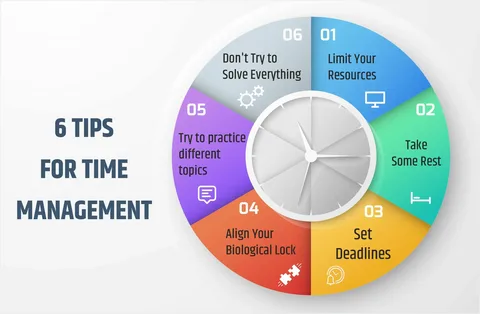Tips for Effective Time Management

Time management is an essential skill that enables individuals to maximize productivity and achieve their goals. In a world filled with distractions and endless responsibilities, mastering time management can significantly enhance both personal and professional life. Here are some effective tips to help you manage your time wisely.
1. Set Clear Goals
The first step to effective time management is setting clear, achievable goals. Determine what you want to accomplish in the short and long term. Use the SMART criteria—Specific, Measurable, Achievable, Relevant, and Time-bound—to define your goals. For instance, instead of saying, “I want to be fit,” specify, “I want to lose 10 pounds in three months.” This clarity will guide your daily activities and decisions.
2. Prioritize Your Tasks
Once your goals are defined, prioritize your tasks based on their importance and urgency. The Eisenhower Matrix is a popular tool for this purpose, dividing tasks into four categories: urgent and important, important but not urgent, urgent but not important, and neither urgent nor important. Focus on tasks that are both urgent and important first, as these contribute directly to your goals.
3. Create a Daily Schedule
Developing a daily schedule can be a game-changer for time management. Use a planner or digital calendar to block out time for each task, including breaks. This structured approach helps you visualize your day and stay on track. Remember to allocate time for unexpected interruptions, as they are inevitable.
4. Limit Distractions
Distractions can derail your productivity. Identify what commonly distracts you—social media, notifications, or noisy environments—and take steps to minimize these disruptions. Consider using apps that block distracting websites during work hours or finding a quiet workspace. By creating an environment conducive to focus, you can significantly improve your efficiency.
5. Use Time Management Techniques
Various time management techniques can enhance your productivity. The Pomodoro Technique, for example, involves working for 25 minutes, followed by a 5-minute break. This method helps maintain focus while preventing burnout. Experiment with different techniques to find what works best for you.
6. Learn to Say No
One of the biggest challenges in time management is overcommitment. It’s crucial to recognize your limits and learn to say no when necessary. Taking on too many responsibilities can lead to stress and decreased productivity. Focus on commitments that align with your goals and values.
7. Delegate Tasks
If you’re in a position to do so, delegate tasks to others. This not only frees up your time but also empowers others to take on responsibilities. Delegating effectively requires trust in your team and clear communication about expectations.
8. Review and Adjust
At the end of each week, take time to review your accomplishments and identify areas for improvement. Reflect on what strategies worked well and which ones need adjustment. This ongoing evaluation process will help you refine your time management skills and become more efficient.
9. Take Breaks and Practice Self-Care
Effective time management also involves taking care of your mental and physical well-being. Schedule regular breaks to recharge and prevent burnout. Engage in activities that you enjoy, such as exercising, reading, or spending time with family and friends. Remember that self-care is essential for maintaining long-term productivity.
10. Celebrate Your Achievements
Lastly, don’t forget to celebrate your achievements, no matter how small. Acknowledging your progress boosts motivation and reinforces positive habits. Whether it’s treating yourself to a favorite snack or buying Diwali gifts for loved ones, rewarding yourself helps create a positive association with your efforts.
In conclusion, mastering time management is crucial for achieving your goals and improving your quality of life. By setting clear goals, prioritizing tasks, creating a schedule, and minimizing distractions, you can take control of your time. Remember, effective time management is a skill that takes practice and dedication, but the rewards are well worth the effort.




